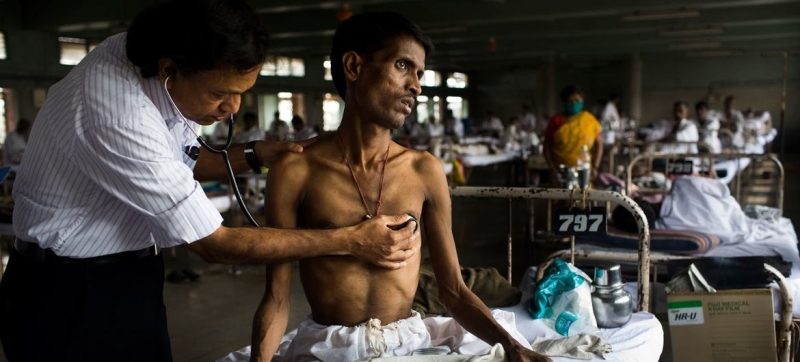- Middle East War Puts Bangladesh Jobs at Risk |
- Starmer criticises Trump, defends UK position not to allow use of its bases |
- Iran War: Nuke watchdog urges restraint amid ongoing strikes |
- 80pc tube wells in Chhatak run dry; water crisis acute |
- Advance Eid train ticket sale begins |
Global TB Cases Decline for First Time Since Pandemic

A doctor consults with a patient at hospital which teats TB in Mumbai, India.
Tuberculosis, or TB, remains one of the world’s deadliest infectious diseases, claiming over 1.2 million lives and affecting an estimated 10.7 million people last year, the World Health Organization (WHO) said on Wednesday.
For the first time since the COVID-19 pandemic of 2020, TB cases are on a downward trajectory.
However, a new report reveals that while progress has been made in the global fight against the disease, funding gaps threaten these hard-won gains.
Funding Gaps Threaten Progress
“Declines in the global burden of TB, and progress in testing, treatment, social protection, and research are all welcome news after years of setbacks, but progress is not victory,” said WHO chief Tedros Adhanom Ghebreyesus.
“The fact that TB continues to claim over a million lives each year, despite being preventable and curable, is simply unconscionable.”
WHO reports that global funding for TB has stagnated since 2020, with just $5.9 billion available in 2024 — far below the $22 billion annual target for 2027. Experts warn that continued underfunding could result in up to two million additional deaths and 10 million new cases over the next decade.
Global Decline
Between 2023 and 2024, the global rate of people falling ill with TB declined by nearly 2%, while deaths fell by 3%.
“The number of people being tested and treated is increasing, and research is advancing,” Dr Tedros said.
As of last year, over half of the global population is covered by rapid TB testing, up from 48% in 2023 to 54% in 2024. Treatment success rates also reached 88%, according to the report.
Some regions have made particularly notable progress. Between 2015 and 2024, the WHO African Region reduced TB incidence by 28%, with deaths falling 46%. The European Region saw a 39% decline in incidence and a 49% drop in deaths.
Despite this progress, in 2024, 87% of new TB cases were concentrated in just 30 countries, where social protection and healthcare access remain highly unequal, the report notes.

